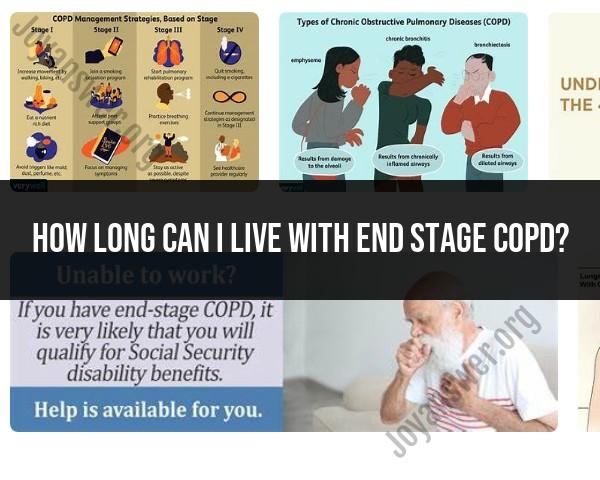How long can I live with end stage COPD?
End-stage Chronic Obstructive Pulmonary Disease (COPD) is a serious and advanced stage of the disease. The life expectancy for individuals with end-stage COPD can vary widely depending on various factors. While I can provide some general information, it's crucial to remember that individual cases vary, and you should consult with a healthcare professional for a personalized assessment. Here are some factors to consider:
Overall Health: Your general health, including the presence of other medical conditions, can significantly impact life expectancy.
Smoking: If you continue to smoke, it can worsen your COPD and reduce your life expectancy.
Pulmonary Function: The severity of lung function impairment is a crucial factor. Your lung function can be assessed through tests like spirometry.
Oxygen Therapy: If your oxygen levels are low, using supplemental oxygen as prescribed by your healthcare provider can improve your quality of life and potentially extend it.
Medication and Treatment: Adherence to medication and treatment plans, such as bronchodilators and inhaled corticosteroids, can help manage symptoms and slow disease progression.
Hospitalizations: Frequent hospitalizations due to COPD exacerbations can be a sign of disease severity and may have an impact on life expectancy.
Nutrition: Malnutrition can be a concern in advanced COPD, and maintaining a healthy diet is important.
Activity Level: Remaining physically active can help manage symptoms and maintain muscle strength.
Support and Healthcare Team: Having a strong support system, including healthcare professionals and caregivers, can improve the management of COPD.
End-of-Life Care Preferences: Discuss your end-of-life care preferences, including any advanced care planning, with your healthcare provider and loved ones.
It's important to note that COPD is a progressive disease, and end-stage COPD is typically associated with significant breathlessness and limitations in daily activities. Palliative care, which focuses on improving the quality of life and managing symptoms, becomes increasingly important in end-stage COPD.
While there is no specific life expectancy for end-stage COPD, and it can vary widely from person to person, individuals with advanced COPD often benefit from discussing their prognosis and care options with their healthcare provider to make informed decisions about their treatment and end-of-life care.
End Stage COPD: Prognosis and Life Expectancy
End-stage COPD is the most severe stage of chronic obstructive pulmonary disease (COPD). It is characterized by significant airflow limitation, frequent exacerbations, and a poor quality of life.
The prognosis for end-stage COPD is poor. The median life expectancy for people with end-stage COPD is three years. However, some people with end-stage COPD can live for many years, while others may die suddenly from an exacerbation.
Factors Affecting Life Expectancy in End Stage COPD
A number of factors can affect life expectancy in end-stage COPD, including:
- Severity of airflow limitation: The more severe the airflow limitation, the worse the prognosis.
- Frequency and severity of exacerbations: Frequent and severe exacerbations can damage the lungs and shorten life expectancy.
- Comorbidities: Other medical conditions, such as heart disease and diabetes, can also shorten life expectancy in end-stage COPD.
- Nutritional status: People with end-stage COPD are often malnourished. This can weaken the immune system and make it more difficult to fight off infections.
- Access to healthcare: People who have access to high-quality healthcare are more likely to live longer with end-stage COPD.
Palliative Care and Quality of Life for End Stage COPD Patients
Palliative care can help to improve the quality of life for people with end-stage COPD. Palliative care is focused on relieving symptoms and improving comfort. It can be provided at home, in a hospital, or in a hospice setting.
Palliative care for end-stage COPD may include:
- Medication management: Medications can be used to control symptoms such as shortness of breath, cough, and pain.
- Oxygen therapy: Oxygen therapy can help to improve breathing and exercise tolerance.
- Pulmonary rehabilitation: Pulmonary rehabilitation is a program of exercise and education that can help people with end-stage COPD to improve their breathing and quality of life.
- Nutritional support: Nutritional support can help people with end-stage COPD to maintain a healthy weight and strength.
- Emotional support: Palliative care can also provide emotional support to people with end-stage COPD and their families.
If you or a loved one has end-stage COPD, talk to your doctor about palliative care. Palliative care can help you to live comfortably and with the best possible quality of life.












